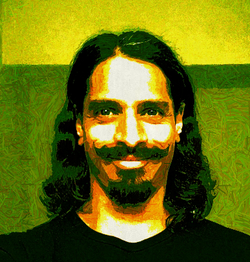― Rudyard Kipling
As I get older I am starting to realize that the gifts of health, wealth, and relationships will eventually disappear. We work so hard to acquire these things as they help us on our life's journey, but when we start to lose them it becomes painful as we struggle to cope with the loss. The Buddhist culture teaches that 'desire' is the root of suffering. It discusses the temporal nature of life, that 'attachment' is the cause of suffering, and that there is freedom in learning to let go of the things that hold us attached to this earthly existence.
I've observed my 8 yr old nephew develop strong attachments to his parents, grandparents, uncles, aunts, cousins, and family friends since his birth. I vividly remember watching him cope with the reality of sharing his parental attachment with the birth of his sister (he cried and clung to his Grandmother). His sister, not knowing anything else, came into the world with a different set of attachments including her big brother. For him, letting go of the exclusive share of attention that he received for the first years of his life was traumatic, but he quickly adapted as children often do. Sibling rivalry is based upon the competition for parental attention as survival instincts drive us to fight for limited resources.
In addition to relationships, we acquire material possessions such as wealth and tools that make life more pleasant and enjoyable. We learn to appreciate our health as we develop our bodies to accomplish things great and small.
It takes practice learning to let go of the big things such as love and relationships. I wrestle with the reality of aging and coming to terms with the fact that my body struggles to keep pace with my younger self. I have been involved with athletic competition since I was a boy. I'm acutely aware of my capabilities and limits. I've recently begun to notice the development of arthritic stiffness in my joints from repetitive usage and scarred tissue from sustained damages. It takes me longer to warm up before I can perform without discomfort. I am dealing with diminished reflexes and longer recovery periods, and the reality of this only getting worse. The prospect of aging brings new challenges to face and ultimately conquer. I can choose to ignore the signs and continue the old path until further injury, or I can appreciate the fact that I've pushed myself to the point that few others can beat. I can look back and take stock of my accomplishments without regret by taking full advantage of my youthful abilities with the benefit of gained wisdom, skill, and residual health.
Another area where I struggle with detachment is in regard to my small business. I'm the son of a business owner and have spent a third of my life building an enterprise that I feel is both profitable to the community and the investor. With the influence of my family, education, past employment, and popular culture I was able to construct an idea into reality (this realization alone is a worthy accomplishment). It took many years of hard work, trial, error, and constant vigilance to hone my business model into something that produced the desired results. Even when positive traction was achieved I found that I couldn't relax for too long without a new challenge presenting itself. I discovered the need for delegating responsibility and relinquishing some profit in order to possess peace of mind and freedom.
One thing that I've always respected about my father was his work ethic. He was the first business owner that I got a chance to see grow his enterprise from humble beginnings as an employee into the Chief Executive Officer. As a child I was quite proud of his title instead of appreciating the actual work needed to run a successful business. He worked long hours and endured great stress to make sure that my mother, brothers, and I were provided for. I recall his salt and pepper hair seemingly turn from black into gray within the first year of starting his company (It's something I've also noticed with Presidents of the United States). He worked early in the morning until late at night, many weekends, and rarely took time for personal relaxation (somehow he still made time for our family). I've always admired his drive, but decided that this style of running a business was not my ideal. I wanted my business to work for me rather than the inverse. I value freedom more than money (unfortunately a little money is needed to achieve some measure of freedom). My father was/is a workaholic to which I witnessed his vice consuming its host. From this I concluded that I would work for my freedom from vice and enslavement.
After a few years, I began to notice that I too was becoming a captive to my business. I would eat, sleep, and wake to my creation. I needed to develop a strategy that would free me without forsaking what I had worked so hard to build. I deeply considered my other dreams and aspirations so that I could take a step back, examine my priorities, and construct a plan to include them in the future. The next step was to delegate my business responsibilities to those I felt could lead the company while taking a step away to observe. I learned much...
I literally removed myself from the 'office' for the period of a year. I kept a close eye on the subtle workings of my business under the supervision of delegates and feedback from the rest of the company. I discovered that without effective leadership things can fall apart quickly. If I was to truly have the peace of mind to run a business from remote I would have to develop a system of trust based upon checks, balances, and fair compensation. If I was to truly become free to chase my dreams, I needed to learn how to 'let go' with confidence.
My dreams included the ability to travel, live in another city, and develop my skills as a writer. All of which involved entrusting the running of my company in the capable hands of others. In order to accomplish this it became necessary to identify and develop the characteristics of good leadership. I noticed that some were better suited to these tasks than others. Some simply wanted the recognition and compensation without putting forth the effort to be effective leaders. I learned to filter lip service and pay attention to actions. I became a student of observing human character. I learned to identify the traits that separated leaders and followers. I learned that in order to be a good leader, I too needed to become proficient at following my own expectations. Thus, I became aware of the value of leadership.
Leaders are individuals capable of following expectations in addition to influencing others to do the same. They can be trusted because it is in their character to do what they agree to do, to practice what they preach, and to keep themselves in integrity. Once leadership is recognized and developed, these individuals can be counted upon to 'step up' and lead the organization so that old leaders can finally relax and 'let go'.
"During my boxing career, you did not see the real Muhammad Ali. You just saw a little boxing and a little showmanship. It was after I retired from boxing that my true work began"
― Muhammad Ali



 RSS Feed
RSS Feed
